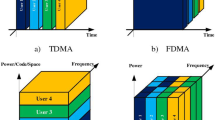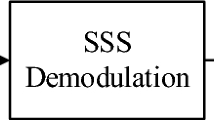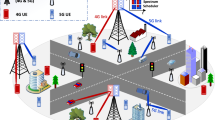Abstract
In this paper, we present a joint game-theoretic approach to perform inter-cell interference coordination in uplink multi-cell orthogonal frequency division multiple access networks. The coordinated user scheduling and power allocation are considered simultaneously. We prove the existence of the joint-strategy Nash equilibrium (NE) in which both the user scheduling and power allocation strategy reach NE. Then, we design a distributed joint-strategy iterative algorithm to perform interference-aware resource allocation where only partial information exchange is involved. Simulation results demonstrate the effectiveness of the proposed algorithm.




Similar content being viewed by others
Notes
In the algorithm, subscript \(k\) is added to distinguish different subchannels.
References
Liang, L., & Feng, G. (2012). A game-theoretic framework for interference coordination in OFDMA relay networks. IEEE Transactions on Vehicular Technology, 61(1), 321–332.
Lee, D., Seo, H., Clerckx, B., Hardouin, E., Mazzarese, D., Nagata, S., & Sayana, K. (2012). Coordinated multipoint transmission and reception in LTE-advanced: Deployment scenarios and operational challenges. IEEE Communications Magazine, 50(2), 148–155.
Yu, W., Kwon, T., & Shin, C. (2013). Multicell coordination via joint scheduling, beamforming and power spectrum adaptation. IEEE Transactions on Wireless Communications, 58(6), 2835–2848.
Zhang, H., Venturino, L., Prasad, N., Li, P., Rangarajan, S., & Wang, X. (2011). Weighted sum-rate maximization in multi-cell networks via coordinated scheduling and discrete power control. IEEE Journal on Selected Areas in Communications, 29(6), 1214–1224.
Han, Z., Ji, Z., & Liu, K. J. R. (2007). Non-cooperative resource competition game by virtual referee in multi-cell OFDMA networks. IEEE Journal on Selected Areas in Communications, 25(6), 1079–1090.
Kiani, S. G., Øien, G. E., & Gesbert, D. (2007). Maximizing multicell capacity using distributed power allocation and scheduling. In Proceedings of IEEE WCNC, Hong Kong.
Chen, M., Liew, S. C., Shao, Z., & Kai, C. (2013). Markov approximation for combinatorial network optimization. IEEE Transactions on Information Theory, 59(10), 6301–6327.
Zheng, J., Cai, Y., Yang, W., Wei, Y., & Yang, W. (2013). A fully distributed algorithm for dynamic channel adaptation in canonical communication networks. IEEE Wireless Communications Letters, 2(5), 491–494.
Zheng, J., Cai, Y., Xu, Y., & Anpalagan, A. (2014). Distributed channel selection for interference mitigation in dynamic environment: A game-theoretic stochastic learning solution. IEEE Transactions on Vehicular Technology. doi:10.1109/TVT.2014.2311496.
Zheng, J., Cai, Y., Liu, Y., Xu, Y., Duan, B., & Shen, X. (2014). Optimal power allocation and user scheduling in multicell networks: Base station cooperation using a game-theoretic approach. IEEE Transactions Wireless Communications. doi:10.1109/TWC.2014.2334673.
Huang, J., Subramanian, V. G., Agrawal, R., & Berry, R. (2009). Joint scheduling and resource allocation in uplink OFDM systems for broadband wireless access networks. IEEE Journal on Selected Areas in Communications, 27(2), 226–234.
Wu, D., Cai, Y., & Sheng, Y. (2010). Joint subcarrier and power allocation in uplink OFDMA systems based on stochastic game. Science China Information Sciences, 53(12), 2557–2566.
Yu, W., & Cioffi, J. M. (2002). FDMA capacity of Gaussian multiple-access channels with ISI. IEEE Transactions on Communications, 50(1), 102–111.
Bacci, G., Bulzomato, A., & Luise, M. (2011). Uplink power control and subcarrier assignment for an OFDMA multicellular network based on game theory. In Proceedings of 5th international ICST, Paris.
La, Q. D., Chew, Y. H., & Soong, B. (2009). An interference minimization game theoretic subcarrier allocation algorithm for OFDMA-based distributed systems. In Proceedings of IEEE GLOBECOM, Honolulu, USA.
Nie, N., & Comaniciu, C. (2005). Adaptive channel allocation spectrum etiquette for cognitive radio networks. In IEEE DySPAN.
Zheng, J., Cai, Y., & Wu, D. (2012). Subcarrier allocation based on correlated equilibrium in multi-cell OFDMA systems. EURASIP Journal of Wireless Communications and Networking, 2012, 233–245.
Zahrani, A. Y., & Yu, F. R. (2011). A game theory approach for inter-cell interference management in OFDM networks. In Proceedings of IEEE ICC, Kyoto, Japan.
Gesbert, D., & Kountouris, M. (2011). Rate scaling laws in multicell networks under distributed power control and user scheduling. IEEE Transactions on Information Theory, 57(1), 234–244.
Monderer, D., & Shapley, L. S. (1996). Potential games. Games and Economic Behavior, 14, 124–143.
Buzzi, S., Colavolpe, G., Saturnino, D., & Zappone, A. (2012). Potential games for energy-efficient power control and subcarrier allocation in uplink multicell OFDMA systems. IEEE Journal of Selected Topics in Signal Processing, 6(2), 89–103.
Song, Y., Zhang, C., & Fang, Y. (2008). Joint channel and power allocation in wireless mesh networks: A game theoretical perspective. IEEE Journal on Selected Areas in Communications, 26(7), 1149–1159.
Shum, K. W., Leung, K., & Sung, C. W. (2007). Convergence of iterative waterfilling algorithm for gaussian interference channels. IEEE Journal on Selected Areas in Communications, 25(6), 1091–1100.
Hamza, A. S., khalifa, S. S., Hamza, H. S., & Elsayed, K. (2013). A survey on inter-cell interference coordination techniques in OFDMA-based cellular networks. IEEE Communication Surveys and Tutorials, 15(4), 1642–1670.
Jain, R., Chiu, D., & Haws, W. (1984). A quantitative measure of fairness and discrimination for resource allocation in shared computer system. Technical Report.
Acknowledgments
This work is supported by the Project of Natural Science Foundation of China (No. 61301163, No. 61301162), and the Jiangsu Provincial Nature Science Foundation of China (BK 20130067).
Author information
Authors and Affiliations
Corresponding author
Rights and permissions
About this article
Cite this article
Cai, Y., Zheng, J., Wei, Y. et al. A Joint Game-Theoretic Interference Coordination Approach in Uplink Multi-Cell OFDMA Networks. Wireless Pers Commun 80, 1203–1215 (2015). https://doi.org/10.1007/s11277-014-2081-8
Published:
Issue Date:
DOI: https://doi.org/10.1007/s11277-014-2081-8




